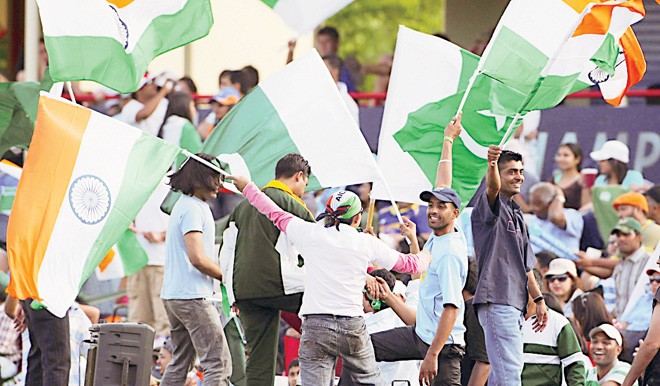

The seemingly inevitable happened last Thursday when Pakistan announced its conditional support to controversial proposals which once implemented would place sweeping powers in the hands to India, England and Australia. The so-called Big Three would be officially allowed to call the shots in the world of cricket, a fact that still sends shivers down the spine of many a true cricket aficionado.
Last week, Wisden added its forceful voice to widespread fears that the power grab could have disastrous repercussions for international cricket. It believes that cricket has become vulnerable to economic exploitation by the powerful Indian cricket board with the English and Australian officials in cahoots.
Pakistan had initially resisted the proposed ICC revamp by refusing to throw its weight behind the ‘Big Three’. At that time, the country’s cricket officials were of the view that with South Africa, Sri Lanka and Bangladesh also opposing the plan, it wasn’t a lost cause. But the other three boards were soon coerced into supporting cricket’s new oligarchy leaving Pakistan as the last man standing.
So was Pakistan left with any other choice but to join the Big Three bandwagon? Najam Sethi, the Pakistan Cricket Board (PCB) chairman didn’t think so.
A shrewd man Sethi read the writing on the wall and took a decision: ‘if you can’t beat them join them’. He negotiated with the Big Three on the sidelines of an Executive Board meeting of the International Cricket Council (ICC) in Dubai last week and later announced that Pakistan has received assurances about bilateral tours from 2015-2023 with all members, especially India.
At the heart of Pakistan’s wish list as far as bilateral matches are concerned is a home series against India. Such a series, if it takes place, would boost PCB’s dwindling bank accounts. But will India actually fulfill its commitment of playing a bilateral series against Pakistan?
India is highly unlikely to send its team to Pakistan because of a variety of reasons which include security concerns but will it agree to play a full series at some neutral venue like the UAE?
There isn’t much optimism about that, if you ask me. After all India has not agreed to playing a full bilateral series against Pakistan after refusing to visit this country in the aftermath of the 2008 terrorist attacks in Mumbai. Hopes were raised when Pakistan toured India in December 2012-January 2013 for a brief limited-overs series after getting promises from India that it would soon reciprocate but that didn’t happen.
The thing is that BCCI has always hidden behind its government whenever the issue of playing against Pakistan in Pakistan or at some neutral venues cropped up. BCCI has stressed, time and again, that only if the government gives its go-ahead can the Indian team be allowed to play against Pakistan.
To say that Indo-Pak relations remain strained would be an understatement. There have been peace moves in recent times but the hawkish approach from some elements especially on that side of the border has made sure that the tensions would continue to simmer.
In fact things might become even more complicated in the coming weeks. With Narendra Modi’s Hindutva brigade threatening to take over power in India following the ongoing general elections across the border, there is a big possibility that any BCCI assurance given to the PCB wouldn’t be worth the paper it’s written on.
Sethi, too, has conceded that things might not go Pakistan’s way. He mentioned the possibility of force majeure, a term that relates to the law of insurance and normally deals with unforeseen events caused by natural elements. But in the case of Indo-Pak cricket relations, the Indian foreign office is one factor that can erase all verbal and written contracts even the ones that are binding. So the thing is that a full series between Pakistan and India hosted by the PCB remains a distant goal.
But that said one has to agree that the PCB was running on empty in its resistance against the Big Three. It was standing alone, leaving Sethi caught between a rock and hard place.
The PCB had the option of sticking to its guns but that could have ended in consolidating Pakistan’s isolation in international cricket. Under normal circumstances, PCB could have continued to resist what certainly is a hostile attempt to take over control of the ICC by the Big Three. But the Board today is a shadow of what is used to be back in the nineties. Then it was a major player in world cricket. Now, it’s not even in the game thanks to uncertainty at the top and a series of disastrous steps taken by successive PCB chiefs in recent years.
Facing such tough times, the only other option for Pakistan was to opt for a U-turn and embrace the big boys in the hope of getting something in return.
Sethi was clear in his mind that the best course for PCB was to go for the second option. When it comes to principles it doesn’t seem right but the approach certainly is a practical one considering the various factors involved.
But it is just the start of what could be a long-drawn struggle by PCB to make sure that Pakistan gets its rightful share of the pie. The promises must be there because otherwise Sethi would not have joined the fray but the Board will now have to make sure that those assurances are actually transformed into regular bilateral tours for Pakistan against all the top Test playing nations especially India. If that’s achieved then one would tend to think that something was salvaged from a seemingly impossible situation. That Mr. Sethi would certainly be an achievement.